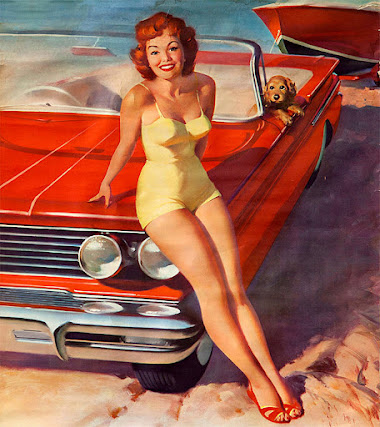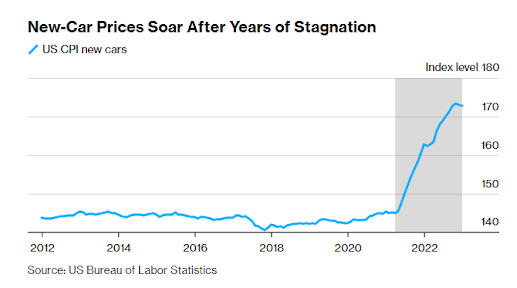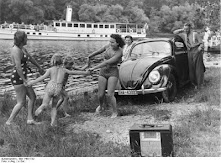Private cars are inefficient and expensive, likely to be the first to suffer from the coming resource crisis. Recent data indicate a crisis in the car market developing right now: prices are growing, while fewer and fewer people can afford cars. Are we going to see the end of cars as we know them (TEOCAWKT)?
Not long ago, at a discussion on electric vehicles, someone rose up from his chair and said aloud, "I have my turbodiesel, and I am going to keep it!" The tone and the attitude implied something like, "and if anyone of those silly greens tries to sell me an electric car, I'll punch him to a pulp." It was a good illustration of the basic rule of politics that says, "nobody wants any change."
Unfortunately for this diesel lover (one of the many), changes are coming, no matter whether people like them or not. Look at these recent data from Bloomberg.

This is an amazing graph, one of a
series illustrating the several rapid changes we are experiencing nowadays. It shows the reversal of a trend that saw cars becoming
more and more affordable over the past 50 years or so. But now, the market is rapidly changing. Prices are soaring, and even used cars are becoming more expensive and difficult to find. Not only are car prices rising, but also those of fuel (especially diesel fuel), maintenance, and insurance. Add to that how governments keep harassing car owners, seen as cash cows to be milked by taxes and traffic sanctions. The results are obvious: A lot of people can't afford cars anymore, Car sales have been declining for several years, but the trend is accelerating, and it will likely accelerate even more in the future (
data from Statista).
We can't say that what's happening is unexpected. Already 50 years ago, the "Limits to Growth" report to the Club of Rome noted that the interplay of resource depletion, pollution, and population increase, would have led to an economic decline during the first decades of the 21st century. It is what we are seeing: people are just becoming poorer. Look at these data (From "
American Compass")
The whole "American way of living," the one that President Bush 1st said was "not negotiable," has been negotiated away already in the 1990s. Maybe "dinks" (double-income, no kids) can still afford two cars in the garage, but for most people, the American dream has truly become a dream. With everything becoming more expensive and salaries not matching the growth of prices, middle-class Westerners -- and in particular lower middle class ones-- have to cut on something. Not buying a new car is often the easiest choice.
Within some limits, having fewer cars and keeping them for a longer time is not a bad thing. It reduces costs and pollution and frees resources for other, more necessary, tasks. Unfortunately, old cars cannot last forever, even assuming that there will be a supply of fuel sufficient to make them run. And the problem is that, in most suburbia, life without a car is nearly impossible. Without cars, people cannot go to work, cannot shop at the supermarket, cannot take their children to school, and the like. Servicing a typical American suburban area with an effective public transportation system is a nightmare: these places were never designed with this idea. So, what's going to happen? Let's sketch a couple of scenarios; remembering that, as usual, the real world will surprise us.
--
The bad scenario. No substantial change is made. Customers remain stuck to their current preferences, the industry focuses on high-end models, where it can still make a profit, and the public refuses to pay for the infrastructure needed for public transportation. Gradually, suburbanites start running out of fuel, of serviceable cars, and of spare parts. Eventually, a large fraction of them becomes unable to move anywhere. Some may be able to work from home, while others turn themselves into backyard vegetable gardeners. But in most cases, no mobility means no job, and no job means no money. That leads to the complete crash of the economic system of vast suburban areas. Suburbanites try to relocate to crowded city centers that can still be supplied with food and other goods, but only a few succeed. For the others, it is the
zombie scenario.
--
The good scenario. The transportation system is reorganized around less expensive vehicles. The industry moves to produce a new generation of light and efficient cars inspired by the old VW "Beetle," but in an electric version that can be recharged by local PV plants. These cars can be made lighter by implementing substantially slower speed limits than the current ones so that they don't need the current cumbersome safety equipment. In time, these vehicles could evolve into the system known as
TAAS (transportation as a service) based on shared ownership and autonomous vehicles, but that's not strictly necessary. The new vehicles are supposed to give suburbanites sufficient mobility to be able to survive as we gradually adapt to a world where natural resources have become rare and expensive.
The first scenario (the "bad" one) seems to be unfolding right now. The backlash against electric vehicles and renewable energy
is in full swing, and we are moving blithely and assuredly toward the desperate attempt to keep alive things that we shouldn't try to keep alive.
The other scenario, the "good" one, would need a strong leadership and the capability of governments to force the industry to produce cheap vehicles, something that the industry does not want to do. It is an unlikely scenario considering another fundamental political principle, "nobody can plan anything." But it is not impossible.
So, as usual, the future is uncertain. There are intermediate scenarios, but the current heavy and expensive cars certainly have no possibility of surviving. In the long run (perhaps even a medium one) TEOCAWKT is unavoidable.
I had already examined this point in a previous post on "Cassandra's Legacy," five years ago. The current events seem to confirm my previous interpretation.
 This is an amazing graph, one of a series illustrating the several rapid changes we are experiencing nowadays. It shows the reversal of a trend that saw cars becoming more and more affordable over the past 50 years or so. But now, the market is rapidly changing. Prices are soaring, and even used cars are becoming more expensive and difficult to find. Not only are car prices rising, but also those of fuel (especially diesel fuel), maintenance, and insurance. Add to that how governments keep harassing car owners, seen as cash cows to be milked by taxes and traffic sanctions. The results are obvious: A lot of people can't afford cars anymore, Car sales have been declining for several years, but the trend is accelerating, and it will likely accelerate even more in the future (data from Statista).
This is an amazing graph, one of a series illustrating the several rapid changes we are experiencing nowadays. It shows the reversal of a trend that saw cars becoming more and more affordable over the past 50 years or so. But now, the market is rapidly changing. Prices are soaring, and even used cars are becoming more expensive and difficult to find. Not only are car prices rising, but also those of fuel (especially diesel fuel), maintenance, and insurance. Add to that how governments keep harassing car owners, seen as cash cows to be milked by taxes and traffic sanctions. The results are obvious: A lot of people can't afford cars anymore, Car sales have been declining for several years, but the trend is accelerating, and it will likely accelerate even more in the future (data from Statista). 




